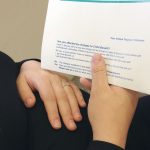In her latest post for Dadbloguk, Standard Life family finance expert and MoneyPlus blogger Julie Hutchison talks tax returns. It’s an issue that causes me a lot of pain and I’m sure many readers will relate to this!

Do you want to avoid joining the 23,000 people who last year filed their tax return online on Christmas Eve, Christmas Day or Boxing Day?
Then again, maybe it’s nice to have a reason to escape for a few hours from the family, the TV Christmas specials and tricky guests in the lounge!

Around 10 million of us are due to file tax returns for tax year 2013/14 by 31st January 2015, and there are good reasons not to leave this until the last minute in January.
Is the bank open?
For one thing, 31st January 2015 falls on a Saturday – keep that in mind if you are due to pay tax, as it will affect when you need to send your payment so it arrives in time. You may need to be more organised and move things forward.
After all, no-one wants a £100 penalty from H M Revenue and Customers for being late.
Register for online tax services
But there’s another good reason not to leave things until January. If you’ve not filed a tax return online before, you need to leave several weeks to get started. That’s because it takes time to register and fully set-up your online account with H M Revenue and Customs.
You can register as a new self-assessment user here. Then you get your activation code by post and need to use that code within 28 days, before it expires.
Christmas and New Year post tends to get delayed, so don’t end up with a £100 penalty because you thought you could start all this on 20th January – it could be too late!
Choices about how to pay your tax
And there’s one more incentive to get you filing online a whole month early, by 30th December at the latest.
If your tax bill is under £3,000, HMRC may be able to adjust your PAYE tax code to recover the tax you are due. This spreads out the cost, although you can also choose to pay it all in one go if you prefer.
Keep in mind the PAYE code adjustment is only an option if you are employed – if you’re self-employed like John is*, you won’t have this option and you’ll most likely be paying 2 instalments a year (before 31st July and 31st January).
So, what are you waiting for? Go and dig out your paperwork, get online and get started. It could help you avoid a £100 penalty, help with your cashflow, and give you an excuse to hide in the study for a few hours!
Julie is a regular blogger on Moneyplus. The information in this blog and any responses to comments are not financial advice.
This commissioned post was produced in association with Standard Life.
* This is a reference to me, John Adams, who owns and writes this blog. I do some freelance work and therefore have to file a tax return.
Photo credit: Callta Kablr. Reproduced under Creatiev Commons agreement. For a link to the various Creative Commons agreements and for information about collaborative posts, please visit this page.






